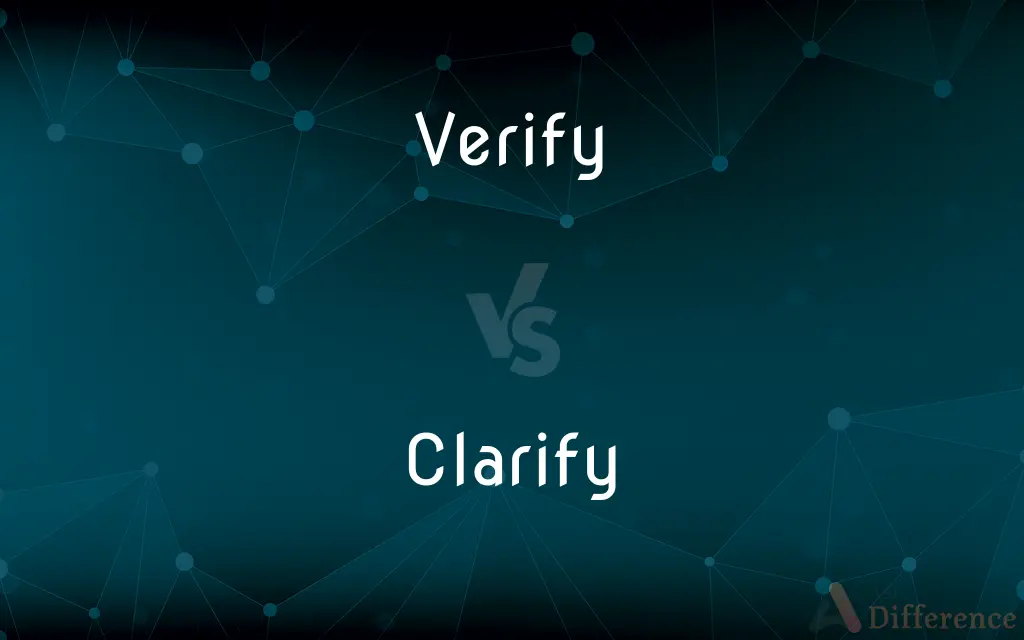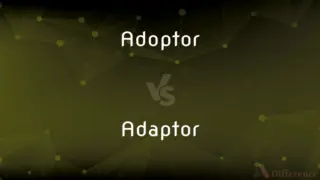Verify vs. Clarify — What's the Difference?
By Maham Liaqat & Fiza Rafique — Updated on March 7, 2024
Verification involves confirming the accuracy or truth of information, focusing on evidence and authenticity, whereas clarification seeks to make something understandable, addressing ambiguities or misunderstandings.

Difference Between Verify and Clarify
Table of Contents
ADVERTISEMENT
Key Differences
Verification is the process of establishing the truth, accuracy, or validity of something through examination or evidence. This process is critical in contexts where the authenticity of information or compliance with specific standards needs to be confirmed. Verification can involve various methods, including cross-checking data, conducting experiments, or using reliable sources to confirm facts. On the other hand, clarification is aimed at eliminating confusion, ensuring understanding, or resolving ambiguities in communication. It often involves explaining, elaborating on details, or providing additional information to make the meaning clear and comprehensible.
Verification serves a crucial role in areas such as research, journalism, and legal processes, where establishing the truth or falsity of claims is essential. It relies on empirical evidence, documentation, and factual accuracy to validate statements or phenomena. Clarification, however, is vital in everyday communication, teaching, and writing, where the goal is to ensure that the message is understood as intended. It enhances comprehension by addressing questions, expanding on complex ideas, or rephrasing statements for better understanding.
While verification seeks to confirm the existence or truth of something through objective evidence, clarification aims to simplify, explain, or make information more accessible. For instance, in scientific research, verifying a hypothesis involves systematic experimentation and analysis to support or refute it. Conversely, clarifying a scientific concept might involve breaking it down into simpler terms or using analogies to make it understandable to a non-expert audience.
Verification often precedes clarification in the information dissemination process. Initially, the authenticity or accuracy of information is verified; subsequently, it may be clarified to ensure it is comprehensible and accessible to the intended audience. Both processes are complementary, with verification ensuring information is reliable and clarification ensuring it is understandable.
Both verification and clarification are essential for effective communication and knowledge dissemination. Verification builds trust and credibility in the information presented, while clarification ensures that the information is effectively communicated and understood by the audience. They address different needs within the communication process but are interconnected in achieving clear and reliable information exchange.
ADVERTISEMENT
Comparison Chart
Definition
Confirming the accuracy or validity of information.
Making something understandable or less ambiguous.
Focus
Truth, accuracy, authenticity.
Understanding, comprehensibility.
Methods
Cross-checking data, experiments, using reliable sources.
Explaining, elaborating, rephrasing.
Importance in
Research, journalism, legal processes.
Communication, teaching, writing.
Outcome
Confirmation of facts or compliance with standards.
Enhanced understanding or resolution of ambiguities.
Compare with Definitions
Verify
Ensuring software functions as intended.
Developers verify the code through testing before release.
Clarify
To make a concept or statement clear and easy to understand.
The teacher clarified the complex topic with a simple analogy.
Verify
Establishing the validity of a theory.
Researchers verify their theories by accumulating empirical data.
Clarify
Explaining the details of a process or idea.
The manual clarifies how to assemble the furniture step by step.
Verify
The process of checking the authenticity of a document.
The company verifies the credentials of potential employees.
Clarify
Removing ambiguities from communication.
He clarified his earlier statement to avoid any misunderstandings.
Verify
Cross-checking information for accuracy.
Journalists verify facts before publishing a story.
Clarify
Providing additional information to ensure understanding.
The author clarified the historical context in the footnote.
Verify
To confirm the truth of a statement through evidence.
Scientists verify hypotheses through controlled experiments.
Clarify
Resolving confusion in a discussion.
The mediator clarified the points of agreement and disagreement among the parties.
Verify
To demonstrate the truth or accuracy of, as by the presentation of evidence
Experiments that verified the hypothesis.
Clarify
Make (a statement or situation) less confused and more comprehensible
The report managed to clarify the government's position
Verify
To attest to the truth of (something) formally or under oath.
Clarify
Melt (butter) in order to separate out the impurities
Seal the pots with a layer of clarified butter
Verify
To make a formal verification in support of (a pleading).
Clarify
To make clear or easier to understand; elucidate
Clarified her intentions.
Verify
(transitive) To substantiate or prove the truth of something.
Clarify
To clear of confusion or uncertainty
Clarify the mind.
Verify
(transitive) To confirm or test the truth or accuracy of something.
Clarify
To make clear by removing impurities or solid matter, as by heating gently or filtering
Clarify butter.
Verify
To affirm something formally, under oath.
Clarify
To become clear.
Verify
To prove to be true or correct; to establish the truth of; to confirm; to substantiate.
This is verified by a number of examples.
So shalt thou best fulfill, best verify.The prophets old, who sung thy endless reign.
Clarify
(of liquids, such as wine or syrup) To make clear or bright by freeing from feculent matter.
Verify
To confirm or establish the authenticity of by examination or competent evidence; to authenticate; as, to verify a written statement; to verify an account, a pleading, or the like.
To verify our title with their lives.
Clarify
To make clear or easily understood; to explain in order to remove doubt or obscurity.
Verify
To maintain; to affirm; to support.
Clarify
(ergative) To grow or become clear or transparent; to become free from feculent impurities, as wine or other liquid under clarification.
Leave the wine for 24 hours and it will clarify.
Verify
Confirm the truth of;
Please verify that the doors are closed
Verify a claim
Clarify
(ergative) To grow clear or bright; to clear up.
Verify
Verify or regulate by conducting a parallel experiment or comparing with another standard, of scientific experiments;
Are you controlling for the temperature?
Clarify
(obsolete) To glorify.
Verify
Attach or append a legal verification to (a pleading or petition)
Clarify
To make clear or bright by freeing from feculent matter; to defecate; to fine; - said of liquids, as wine or sirup.
Verify
To declare or affirm solemnly and formally as true;
Before God I swear I am innocent
Clarify
To make clear; to free from obscurities; to brighten or illuminate.
To clarify his reason, and to rectify his will.
Clarify
To glorify.
Fadir, clarifie thi name.
Clarify
To grow or become clear or transparent; to become free from feculent impurities, as wine or other liquid under clarification.
Clarify
To grow clear or bright; to clear up.
Whosoever hath his mind fraught with many thoughts, his wits and understanding do clarify and break up in the discoursing with another.
Clarify
Make clear by removing impurities or solids, as by heating;
Clarify the butter
Clarify beer
Common Curiosities
How does verification affect credibility?
Verification enhances the credibility of information by ensuring it is accurate and reliable, building trust among the audience.
Can clarification change the meaning of information?
Clarification does not change the meaning but makes the original message clearer and easier to understand, eliminating misunderstandings.
What is the purpose of verification?
The purpose of verification is to confirm the accuracy, truth, or validity of information, ensuring it is based on evidence and facts.
When is clarification needed?
Clarification is needed when there is confusion, ambiguity, or a lack of understanding about information or a concept.
Can verification lead to a need for clarification?
Yes, verifying information can sometimes reveal complexities or nuances that require clarification to be fully understood.
How does context affect clarification?
Context significantly affects clarification, as the same information may need to be clarified differently depending on the audience's knowledge and expectations.
Is verification always possible?
Verification may not always be possible due to limitations in access to information or evidence, in which case credibility might rely on the source's reputation.
Is clarification subjective?
Clarification can have subjective elements, as it may involve interpreting information or ideas to make them accessible to a particular audience.
What role does expertise play in clarification?
Expertise is crucial for effective clarification, as a deep understanding of the subject is necessary to explain it in simpler terms.
What methods are used for verification?
Methods for verification include cross-referencing with reliable sources, conducting experiments, and using empirical data.
Why is clarification important in communication?
Clarification is important to ensure that messages are understood as intended, preventing misinterpretations and enhancing comprehension.
What challenges are there in verification?
Challenges in verification include accessing reliable information, distinguishing between accurate and false information, and overcoming biases.
How do verification and clarification work together?
Verification ensures the information is accurate, while clarification ensures it is understood; both are essential for effective communication.
Can technological tools assist in verification?
Yes, technological tools, such as fact-checking software and data analysis tools, can assist in the verification process.
How can one ensure effective clarification?
Effective clarification can be ensured by understanding the audience's perspective, using clear and concise language, and providing relevant examples or analogies.
Share Your Discovery

Previous Comparison
Lady vs. Lass
Next Comparison
Adoptor vs. AdaptorAuthor Spotlight
Written by
Maham LiaqatCo-written by
Fiza RafiqueFiza Rafique is a skilled content writer at AskDifference.com, where she meticulously refines and enhances written pieces. Drawing from her vast editorial expertise, Fiza ensures clarity, accuracy, and precision in every article. Passionate about language, she continually seeks to elevate the quality of content for readers worldwide.
















































